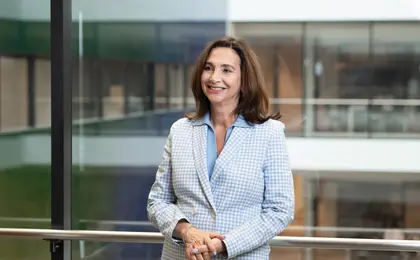
Helene York ’88
MBA
Independent strategic advisor, food supply chain
Helene York ’88 was investigating the standards of food suppliers for Google in Dublin when she noticed all the potatoes being served at the company’s European headquarters looked the same.
She asked the company’s produce supplier how many varieties he offered.
“He said, ‘six,’” she remembers. “‘Small, medium, large white; and small, medium, large red.’”
For someone whose job is to improve sustainability in food supply chains—and in a country in which a devastating 19th-century famine was made worse by monoculture in potato farming—that was the wrong answer. Soon, with York’s support, a farmer had planted 10 million pounds of heirloom potatoes in six different varieties, with a perimeter of pollinator plants to help the country’s bee population.
“It was a big success, not only for the environment, but for the farmer as well,” York says.
Catalyzing large-scale shifts like that is the goal for York, who, after starting her career in affordable housing development, has spent more than 15 years changing the way food is sourced and served. At Bon Appétit Management Company, which handles dining options for corporations, universities, and museums, she helped launch the Low Carbon Diet Program, the first national effort to focus on the connection between food and climate change, and developed a Fish to Fork program that trained chefs to work with responsible aquaculture producers and fishermen. Recently, she helped food services company ISS Guckenheimer develop aggressive food waste reduction goals and in its commitment to the World Resources Institute’s Cool Food Pledge, which encourages organizations to reduce the greenhouse gas emissions of the food they serve.
Now an independent consultant and an adjunct professor at the Culinary Institute of America’s Food Business School, York is just as passionate as ever about making sure environmental and social values are a regular part of the food procurement process.
“I enjoy the work,” York says. “It’s fascinating to me.”
Food has always been important to York: She can remember her Lebanese grandmother in Brooklyn making “amazing” meals for the family on Sundays; her grandfather had a successful business importing and manufacturing Middle Eastern foods; and York began cooking for her parents and brother when she was around 14. Nevertheless, her father discouraged her from pursuing food professionally.
After attending Hunter College High School, York studied government at Harvard University with a focus on women’s participation in the political process. When she graduated in 1983, she worked as the chief of staff for a New York City council member before forming her own nonprofit to focus on housing access. When the resources dried up, she decided to go back to school to explore affordable housing further.
Yale SOM appealed to her in part because of the “support of the student community for each other.”
“I felt so honored to be part of this community of awesome SOMers who were looking out for each other, mentoring each other,” she says. “It was terrific.”
York worked in real estate and community investment for several years before finding her way back to food. In 2005, she saw a Craigslist posting for a Bon Appétit job funded by a grant from the sustainable seafood organization Seafood Watch.
“It was one of those serendipitous things,” she says. “This was a new kind of job. They were looking for someone to engage with chefs and teach them principles of sustainable seafood.”
For York, the role was a good fit. The sustainable food movement requires aligning consumer preferences, best practices, and corporate bottom lines; her previous positions involved merging the interests of bankers and affordable housing developers.
“My special skill is bringing people together,” she says.
York stayed at Bon Appétit and its parent company, Compass, for more than 10 years, working with client companies like Google, for which she served as global director for responsible business. She also worked as head of social and environmental responsibility at ISS Guckenheimer before going out on her own as a consultant in 2020.
She says the industry has changed a great deal since she first began in the field. Food supply investigations—and therefore food production practices—previously focused mostly on food safety and labor standards. Now, investigations cover everything from animal welfare to environmental and social concerns—as well as equity issues. On a recent visit to an orchard in California’s Central Valley, for instance, she noticed that all the kiwi trees had platforms underneath them. When she asked about them, the grower explained that the platforms enabled women to pick from the taller branches and allowed the women to earn the same high scale of pay as the men.
York says change is possible when large-scale buyers tell producers their goals and ask for their help in meeting them.
“People who produce food—to a one—have been honest, proud of what they do, and open to ideas,” she says. “In order to get lasting change, we need the whole industry working on this.”





